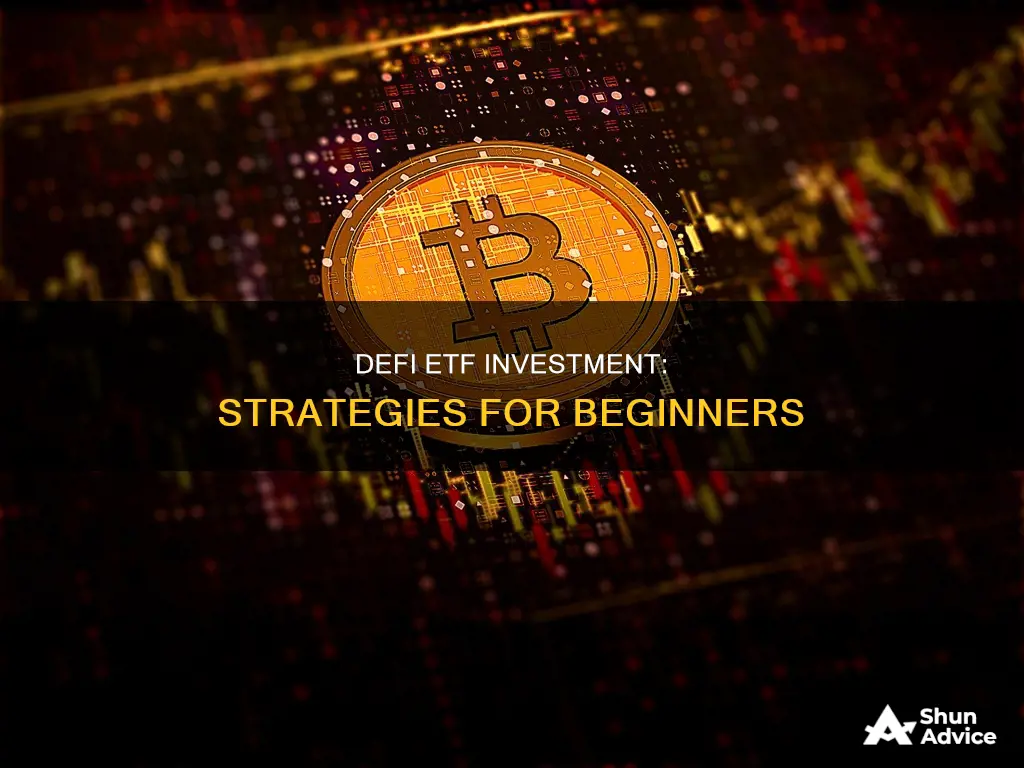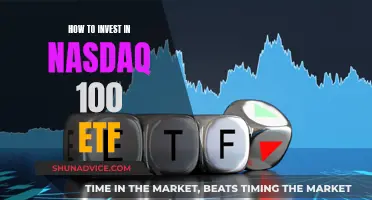
Decentralized finance (DeFi) is a financial system built on blockchain technology, allowing for peer-to-peer transactions without intermediaries such as banks or exchanges. DeFi sets the stage for a world without traditional brokers, making financial transactions faster, more affordable, more transparent, and more accessible.
The world's first exchange-traded fund dedicated to decentralised finance networks, the Hashdex DeFi Index ETF, was launched in Brazil in February 2022. The fund invests in tokens developed by decentralised applications (DApps) and networks built on blockchain technology.
There are several ways to invest in DeFi. One simple option is to buy Ether or another coin that uses DeFi technology. This provides broad exposure to the DeFi industry. You can also deposit cryptocurrency with a DeFi lending platform to earn interest on your holdings.
If you want to have a say in the future of DeFi protocols, you can buy a governance token like Uniswap's UNI. As more people participate in the decision-making process, the demand for and price of the token can increase significantly.
What You'll Learn

Choose a crypto wallet
There are several types of crypto wallets, and it's important to understand the differences between them, especially in terms of security and usability. The first differentiation is whether a wallet is custodial or non-custodial.
Non-custodial crypto wallets give users full control over their funds. No one, not even the company providing the wallet, can access the user's funds. Desktop wallets and mobile wallets are examples of non-custodial wallets. Desktop wallets are software that you download and execute on your computer. They generate a private key that is stored locally on your computer, in a dedicated file. Mobile wallets work similarly, but are designed for smartphones and can use security measures from the smartphone's operating system like Face ID or Touch ID.
On the other hand, custodial wallets hold crypto funds on behalf of their clients. This means that the wallet provider holds all funds and is responsible for securing them. They are often compared to banks and are regulated financial companies. Famous examples of custodial wallet providers include Coinbase, Xapo and Wirex.
Another type of wallet is a hardware wallet, which is a physical device that stores your private keys. Examples include Ledger, Trezor, KeepKey, BitBox and Coldcard. Hardware wallets are considered more secure because they are not connected to the internet and are therefore less prone to attacks.
When choosing a crypto wallet, security is the top priority as several hack attacks have targeted these tools. It is recommended to use a mix of cold and hot wallets to protect your funds. Other factors to consider include compatibility, usability, integration options, and transaction fees.
If you're looking to invest in DeFi, the best wallet to use is MetaMask, as it has a Google Chrome extension that allows you to easily connect to DeFi platforms via your browser.
A Smart Guide to Investing in Dow Jones ETFs
You may want to see also

Purchase crypto coins
There are several ways to buy crypto coins, including through cryptocurrency wallet apps, brokerages, cryptocurrency centralized exchanges (CEXs), and peer-to-peer crypto exchange platforms.
One of the most popular ways to buy crypto is through a cryptocurrency exchange, which is a platform dedicated to facilitating the trading of cryptocurrency. Depending on the exchange, you can trade one cryptocurrency for another, exchange fiat money (like the US dollar) for cryptocurrency, or vice versa. Prices are usually based on daily market rates.
Some of the top crypto exchanges include:
- EToro
- Webull
- Binance.US
- Uphold
- Coinbase
When choosing a crypto exchange, it's important to consider factors such as fees, security, and reputation. Many exchanges charge trading fees, deposit fees, and withdrawal fees, so it's essential to understand the cost structure before signing up. Security is also a major consideration, and features like two-factor authentication and cold storage can help protect your crypto assets.
Another way to buy crypto is through a brokerage, such as eToro or Coinbase. These platforms may offer a more limited selection of cryptocurrencies compared to exchanges, but they can be a good option for investing in other asset classes, such as stocks, bonds, and ETFs.
Additionally, some payment apps, like Cash App, PayPal, and Venmo, now offer the ability to buy, sell, or hold cryptocurrencies.
For those who prefer a more direct approach, peer-to-peer (P2P) marketplaces are decentralized exchanges that allow investors to buy and sell cryptocurrency using smart contracts. These platforms don't hold investors' funds, making them less appealing to hackers, and they often charge lower fees.
Lastly, cryptocurrency wallet apps, like the Bitcoin.com Wallet app, can also be used to buy, sell, and trade crypto. These apps provide a convenient way to manage your crypto assets in one place.
Regardless of the method you choose, it's important to remember that investing in cryptocurrencies carries significant risks due to their highly volatile nature. It's recommended to do your research, understand the basics of cryptocurrency and blockchain technology, and only invest what you can afford to lose.
A Beginner's Guide to Silver ETF Investing
You may want to see also

Get started with protocols
Now that you have your crypto wallet set up and loaded with crypto coins, it's time to dive into the protocols that make DeFi so popular. Protocols are "smart contracts" – code-based agreements that contain the details of a transaction, enabling people to trade crypto, lend and borrow crypto coins, participate in liquidity pools, and more.
There are protocols that enable investors to lend crypto, trade crypto, stake (or lock up) crypto for a reward, participate in liquidity pools where you'll receive earnings when trades are made in your pools, engage in yield farming where your participation in a loan earns you interest, and more.
The typical workflow when interacting with a protocol is to visit that protocol's website or app, connect your wallet so that their platform can access your crypto coins, and follow their instructions to start trading, yield farming, or doing whatever else the protocol was built for.
Aave
Aave is seen by cryptocurrency enthusiasts as the world's bank. It is one of the leading DeFi platforms and has the most cryptocurrency managed on its platform. Aave users can deposit their crypto into savings accounts to earn interest, and they can also take out collateralized loans to leverage their crypto positions.
Uniswap
Uniswap is the leading decentralized exchange (DEX) on Ethereum. Uniswap lets anyone trade cryptocurrency without a centralized exchange that holds their funds. Instead, the smart contract protocol interacts directly with users' Ethereum wallets, creating a trustless, permissionless, and secure way to exchange cryptocurrency. Uniswap also has a governance token, UNI, which gives you decision-making authority about the future of the Uniswap protocol.
DeFi Pulse Index
This tokenized asset, available on Uniswap, represents major DeFi platforms, so you don't need to pick and choose your DeFi investments individually.
Curve
Curve is similar to Uniswap in that it's an automated market maker (AMM), but it also hosts other valuable functions. The platform specializes in stablecoin assets, making tokens like DAI and USDC extremely easy to transfer with low slippage and fees.
Yearn.finance
Yearn.finance has been around since the early days of DeFi, and its main product is decentralized lending. It also offers decentralized insurance and yield farming products. Yearn.finance deploys users' funds in other DeFi protocols, such as Aave, Compound, and dydx, to consistently offer the highest interest rates on the market.
Remember, directly interacting with DeFi programs is the best way to learn about this new and growing industry. Plus, you'll generate interest on your cryptocurrency, which is a great opportunity to grow your crypto portfolio without needing to continuously invest more capital.
ETFs: A Smart Investment Strategy for Your Money?
You may want to see also

Track your investments
Tracking your investments is an important part of investing in DeFi ETFs. Here are some ways to do that:
Use a Portfolio Tracker
You can use a portfolio tracker like Kubera to monitor and manage your DeFi assets alongside your traditional assets. Kubera is an all-in-one platform that integrates with various financial institutions, including banks and brokerages, to automatically update your balances. You can also add individual assets like real estate, crypto, and collectibles to track their real-time value. Kubera also allows you to define your preferred currency, so you can easily track the value of your portfolio across different countries.
Understand ETF Investment Details
When investing in a DeFi ETF, it's important to understand the details of your investment. ETFs, or Exchange-Traded Funds, are baskets of assets that you can buy or sell on a stock or cryptocurrency exchange. They allow you to diversify your portfolio without having to buy individual stocks or bonds. By investing in an ETF, you buy a collection of assets that track a particular index, such as stocks, bonds, or commodities. This means that the performance of your investment is tied to the performance of the underlying assets in the ETF.
Monitor ETF Performance
To track the performance of your DeFi ETF investments, pay attention to the growth rates and returns. You can usually find this information on the ETF provider's platform or through third-party investment websites. Monitor how the value of your ETF shares changes over time, especially in response to market fluctuations. This will help you evaluate the success of your investment strategy and make informed decisions about buying, holding, or selling.
Stay Informed About the Crypto Market
The value of DeFi ETF investments is closely tied to the performance of the cryptocurrency market. Stay informed about crypto market trends, news, and developments that can impact the value of your investments. Follow crypto news sources, analysis websites, and market predictions to make more strategic investment decisions. Understanding the broader market dynamics will help you better track and predict the performance of your DeFi ETF investments.
Review and Rebalance Your Portfolio Regularly
Regularly review your investment portfolio to assess the performance of your DeFi ETF investments in the context of your overall financial strategy. Evaluate if the ETFs you've invested in are meeting your risk and return expectations. Depending on your investment goals, you may need to rebalance your portfolio by adjusting the allocation of assets or exploring new investment opportunities. Many investment platforms offer tools and resources to help you analyze and optimize your portfolio over time.
ETFs: A Collective Investment Scheme? Understanding the Basics
You may want to see also

Understand the risks
Decentralized Finance (DeFi) is a relatively new phenomenon that was made possible by Ethereum's network, specifically smart contracts. DeFi is a financial system built on blockchain technology, allowing for peer-to-peer transactions without intermediaries such as banks or exchanges. While DeFi offers several benefits, such as greater transparency, resistance to censorship, and faster settlement times, it also comes with certain risks that investors should be aware of. Here are some key risks to consider:
Software Risk: DeFi protocols are software applications that run on the internet with minimal human oversight and often handle large amounts of money. As with all software, there is a risk of coding errors or "bugs" that may cause malfunctions, as well as security vulnerabilities that hackers can exploit to steal funds. It is essential to research the track record of a DeFi protocol, whether they have been hacked before, and what steps they have taken to minimize software risk, such as code audits and bug bounty programs.
Counterparty Risk: Counterparty risk is inherent in any loan agreement, including those in the DeFi ecosystem. It refers to the risk of loaning money to someone who does not repay. When investing in a DeFi lending protocol, it is crucial to understand who the borrowers are and how the loans are collateralized.
Cryptocurrency Volatility: DeFi investments often involve various cryptocurrency tokens, which are highly volatile and unpredictable. The prices of tokens in a liquidity pool may change at different rates, leading to impermanent loss, where you would have been better off simply holding your tokens instead of depositing them in the pool. Conduct thorough research on the tokens involved in your investment and consider using stablecoins, which are designed to maintain a stable value.
High Transaction Fees: Ethereum transaction fees, known as "gas fees," can be very high, especially for complex transactions. These fees can potentially outweigh your investment returns, so it is important to consider them when investing in DeFi protocols that run on the Ethereum blockchain.
Regulatory Uncertainty: Currently, DeFi protocols operate with minimal government oversight or regulation. However, this situation could change, and it is challenging to predict how new regulations might affect your investments. Regulatory changes could impact the viability and profitability of your DeFi investments.
Lack of Transparency: While DeFi transactions are recorded on a public blockchain, the market is not entirely transparent. Professional investors and insiders may have access to better information and reap higher returns, putting retail investors at a disadvantage. Additionally, the pseudonymous nature of blockchain transactions makes it difficult to identify manipulative trading activity, which can impact asset prices and trading volumes.
Market Volatility: The DeFi market is highly volatile, and asset prices can fluctuate significantly. This volatility can lead to substantial gains or losses for investors. It is important to carefully consider your risk tolerance and the potential impact of market volatility on your investments.
Platform Reliability: The newness of DeFi technology means that negative outcomes can occur unexpectedly. Startups using DeFi may fail, and errors by programmers can create opportunities for hackers. Investing in or storing money with an unreliable DeFi project could result in the total loss of your funds, as there may be no means of recovering lost money.
A Smart Guide to CPSE ETF FFO Investment
You may want to see also
Frequently asked questions
DeFi stands for "decentralized finance". It is a financial system built on blockchain technology, allowing for peer-to-peer transactions without intermediaries such as banks or exchanges.
First, you need a crypto wallet to store your crypto coins. Then, purchase crypto coins, preferably Ether coins or ERC-20 tokens as most protocols are built on Ethereum. Finally, get started with protocols by visiting a protocol's website or app, connecting your wallet, and following their instructions.
DeFi offers greater autonomy, transparency, and financial inclusion. It eliminates the need for traditional banking institutions and their associated fees, paperwork, and minimum asset thresholds. With DeFi, you can access better interest rates and lower fees, and you can take more control over your financial future.
As DeFi is a new technology, negative outcomes can unexpectedly occur. Start-ups that use DeFi technology may fail, and errors by programmers can create profitable opportunities for hackers. If a DeFi project fails, you could lose your entire investment as there is no means to recover lost money.







